Daily Vocabulary Words: List of Daily Used Words
Hi there. Welcome to this special section @ Wordpandit.
Our endeavour here is straightforward: highlighting important daily vocabulary words, you would encounter in The Hindu. This is your repository of commonly used words; essentially, we are posting a list of daily used words. Hence, this has significant practical application as it teaches you words that are commonly used in a leading publication such as The Hindu.
Visit the website daily to learn words from The Hindu.
WORD-1: Ascendency
CONTEXT: The political ascendency of Donald Trump was, no doubt, a turning point as the conservatives stepped up their attack on the ethics of DEI and its political manifestation.
SOURCE: The Hindu
Explanatory Paragraph: Ascendency is like being the leader in a game where everyone follows what you say because you have the best ideas. It means having power or influence over others.
Meaning: The state of having dominant power or control (noun).
Pronunciation: uh-SEN-duhn-see
Synonyms: dominance, supremacy, control, authority, predominance
Usage Examples:
1. The company gained ascendency in the market.
2. Her ascendency in the political arena grew over the years.
3. They are vying for ascendency within the organization.
4. The coach’s personality had an ascendency over the team.
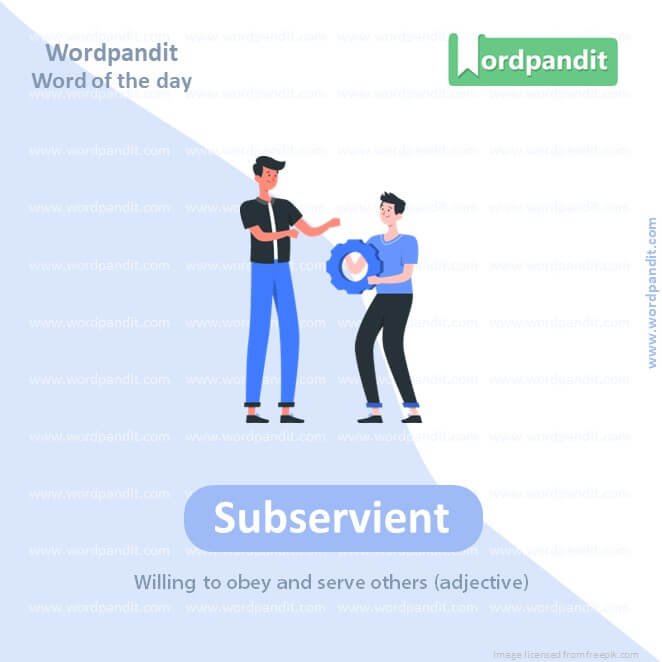
WORD-2: Subservient
CONTEXT: In their epistemic fabric, an academician’s political persuasion or ideological commitment is no longer an individual’s sovereign choice but ought to be subservient to their edict since their illiberal nationalism is equated with virulent patriotism.
SOURCE: The Hindu
Explanatory Paragraph: Subservient is like when you help your friend follow the rules of a game or do something they ask because you want to be nice. It means being very willing to obey someone else.
Meaning: Willing to obey and serve others (adjective).
Pronunciation: sub-SUR-vee-uhnt
Synonyms: submissive, compliant, obedient, docile, servile
Usage Examples:
1. She was tired of being subservient to her boss.
2. The role was largely subservient and lacked authority.
3. He had a subservient attitude towards his superiors.
4. The firm was subservient to the larger corporation.
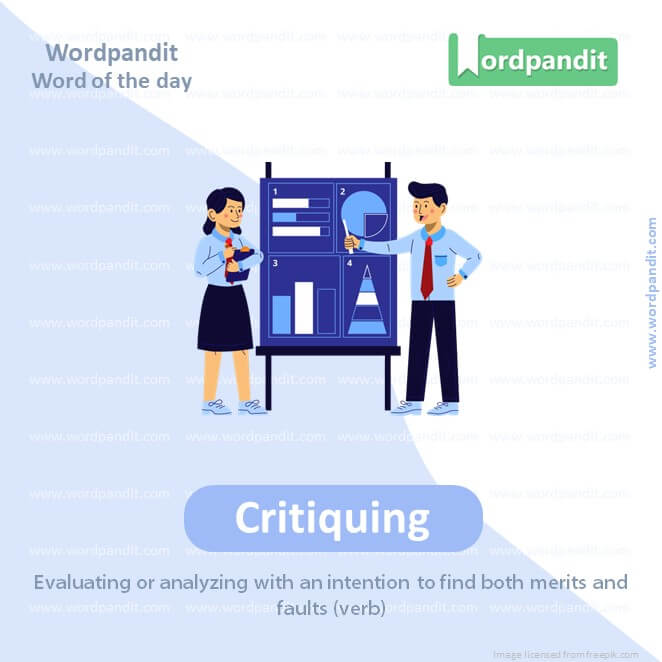
WORD-3: Critiquing
CONTEXT: their illiberal nationalism is equated with virulent patriotism. Hence, disputing or critiquing right-wing populism may spell deeper trouble for academics.
SOURCE:The Hindu
Explanatory Paragraph: Critiquing is like looking at your own drawing and deciding what you like about it and what you could do better next time. It means examining things in detail to see both the good parts and the parts that need improvement.
Meaning: Evaluating or analyzing with an intention to find both merits and
faults (verb).
Pronunciation: krih-TEEK-ing
Synonyms: analyzing, evaluating, assessing, reviewing, appraising
Usage Examples:
1. She spent the afternoon critiquing students’ essays.
2. The committee is critiquing the proposal for changes.
3. He has experience in critiquing art for galleries.
4. The performance was critiqued by several well-known critics.
WORD-4: Emboldened
CONTEXT: It has no doubt emboldened the conservative political class here in India.
SOURCE: The Hindu
Explanatory Paragraph: Emboldened is like when you feel brave enough to try the big slide because all your friends cheered for you. It means feeling confident and brave to do something maybe you were scared to do before.
Meaning: Made bold or courageous (verb).
Pronunciation: em-BOL-dend
Synonyms: encouraged, fortified, strengthened, heartened, inspired
Usage Examples:
1. They were emboldened by the success of the project.
2. Her words emboldened him to speak out.
3. The victory emboldened the team.
4. The support from her family emboldened her to pursue her dreams.
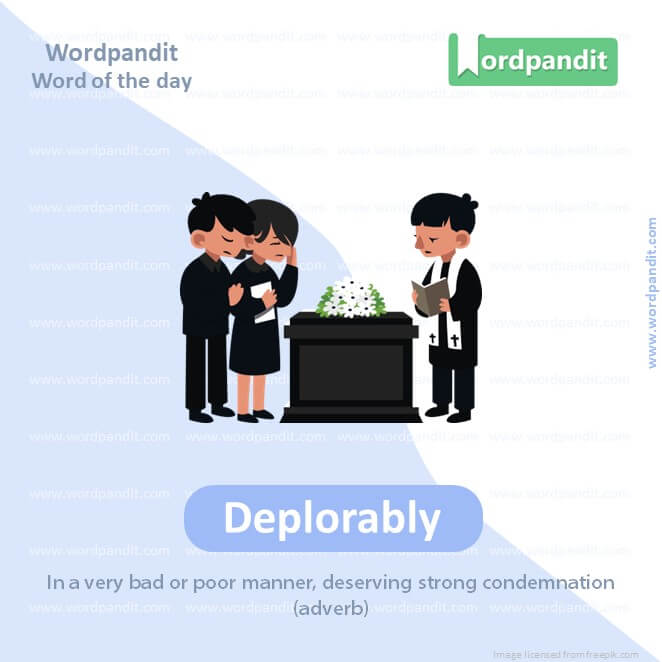
WORD-5: Deplorably
CONTEXT: the political right is deeply communal and deplorably divisive. Hence their didactic narratives on polity and society are either a harangue or quite pedestrian.
SOURCE: The Hindu
Explanatory Paragraph: Deplorably is like when something is so messy or done so badly that it makes you feel sad or upset. It means something is really poor in quality or condition.
Meaning: In a very bad or poor manner, deserving strong condemnation (adverb).
Pronunciation: dih-PLOHR-uh-blee
Synonyms: terribly, awfully, disgracefully, lamentably, woefully
Usage Examples:
1. The facilities were in deplorably bad condition.
2. He behaved deplorably at the event.
3. The project was managed deplorably.
4. Conditions in the camp were deplorably poor.
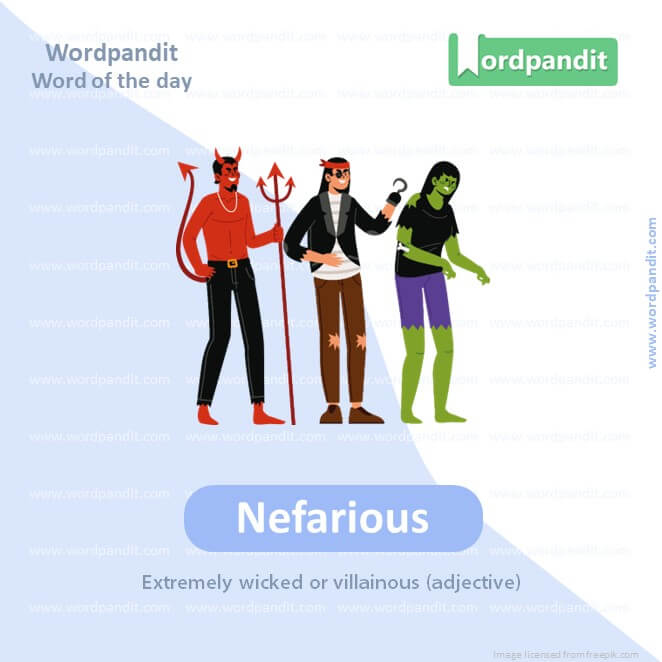
WORD-6: Nefarious
CONTEXT: Our academia have largely remained impervious to the nefarious designs of majoritarian communalists as the freedom struggle, with its solid secular orientation, shaped the post-colonial academic milieu.
SOURCE: The Hindu
Explanatory Paragraph: Nefarious is like a villain in a story who comes up with sneaky plans to cause trouble. It means something is wicked or criminal.
Meaning: Extremely wicked or villainous (adjective)
Pronunciation: nih-FAIR-ee-us
Synonyms: evil, sinful, villainous, corrupt, malevolent
Usage Examples:
1. The group was known for its nefarious activities.
2. He had a reputation for engaging in nefarious schemes.
3. The plot was uncovered and found to be nefarious.
4. She was arrested for her nefarious dealings.
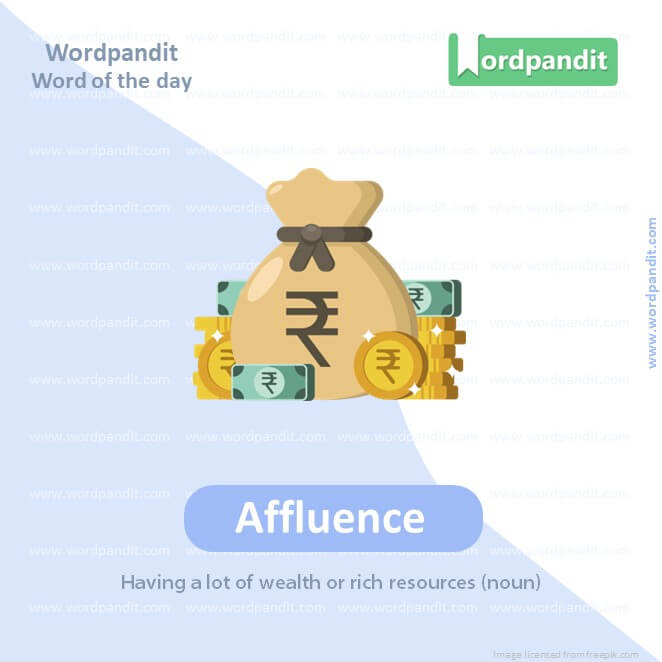
WORD-7: Affluence
CONTEXT: Their social privilege and affluence did not deter them from speaking up for subaltern communities and the underprivileged.
SOURCE: The Hindu
Explanatory Paragraph: Affluence is like when someone has a lot of money and can buy a lot of toys or go on big trips. It means having a lot of wealth and money.
Meaning: Having a lot of wealth or rich resources (noun).
Pronunciation: AF-loo-uhns
Synonyms: wealth, richness, prosperity, opulence, wealthiness
Usage Examples:
1. The neighborhood is known for its affluence.
2. They enjoyed a lifestyle of considerable affluence.
3. The city’s affluence is visible in its upscale shops and luxurious cars.
4. Economic growth led to greater affluence in the region.
WORD-8: Distressing
CONTEXT: the insidious nature of right-wing populism sends out a distressing signal as its coercive tantrums may wreck the academic spirit over time.
SOURCE: The Hindu
Explanatory Paragraph: Distressing is like when something happens that makes you feel really sad or worried, like if your favorite toy breaks. It means causing sadness, worry, or discomfort.
Meaning: Causing anxiety, sorrow, or pain (adjective).
Pronunciation: dih-STRESS-ing
Synonyms: upsetting, troubling, worrisome, painful, disturbing
Usage Examples:
1. The news of the accident was very distressing.
2. She found the movie scenes to be quite distressing.
3. It was a distressing situation for everyone involved.
4. They received some distressing health news.
WORD-9: Unceremonious
CONTEXT: Ms. Gay’s unceremonious exit seems to be an apt ingress for the cheerleaders of right-wing populism to ramp up their tirade against the spirit of DEI here too.
SOURCE: The Hindu
Explanatory Paragraph: Unceremonious is like when someone takes away your toy without saying please or thank you. It means doing something rudely, without any formalities or politeness.
Meaning: With a lack of courtesy; roughly or abruptly (adjective).
Pronunciation: un-ser-uh-MO-nee-us
Synonyms: abrupt, rude, brusque, blunt, discourteous
Usage Examples:
1. His departure was unceremonious.
2. She was upset by the unceremonious dismissal.
3. The decision was made in an unceremonious manner.
4. They entered the room in an unceremonious way.
WORD-10: Inadvertent
CONTEXT The silence in the draft University Grants Commission (Setting up and Operation of Campuses of Foreign Higher Educational Institutions in India) Regulations, 2023, on reservation in students’ admission and faculty appointment is not inadvertent.
SOURCE: The Hindu
Explanatory Paragraph: Inadvertent is like when you accidentally knock over a glass of water because you didn’t see it there. It means doing something without intending to, often leading to a mistake.
Meaning: Not resulting from or achieved through deliberate planning (adjective).
Pronunciation: in-ad-VUR-tent
Synonyms: unintentional, accidental, unintended, unpremeditated, unplanned
Usage Examples:
1. The error was completely inadvertent.
2. He made an inadvertent comment that offended some guests.
3. The damage was an inadvertent result of the renovation.
4. Her inadvertent omission caused confusion.
Vocabulary PDF
In the digital age, the way we learn languages has transformed dramatically. Among the myriad of resources at our disposal, a ‘vocabulary PDF’ serves as an incredibly effective tool. It offers a structured, accessible and convenient method of enhancing our language skills. To maximize the potential of ‘vocabulary PDF’, it is crucial to understand how to make the most of it.
First off, when venturing through the process of learning with a ‘vocabulary PDF’, maintaining consistent learner engagement is pivotal. This involves regular revision sessions where you consistently go back and refresh your memory about previously learned words. This cyclic process is particularly effective in promoting long-term retention of the vocabulary.
While leveraging a ‘vocabulary PDF’, it’s also beneficial to annotate as you progress. Annotation brings an interactive aspect to your learning, making it dynamic and personalized. Make notes of context, synonyms, antonyms, or even create sentences using the new words. This engagement with the ‘vocabulary PDF’ aids in imbibing the meaning and usage of the words.
Another strategic approach to mastering a ‘vocabulary PDF’ is to utilize a reading aloud technique. Listening to the words as you speak them out loud can stimulate auditory learning, enhancing your pronunciation and comprehension of the vocabulary.
When using a ‘vocabulary PDF’, it is also advantageous to supplement your learning through applications of the new words. Write an essay, engage in a conversation, or post on social media using the new words. This reinforces the acquired vocabulary, augmenting your grasp over them.
In conclusion, a ‘vocabulary PDF’ is a potent instrument that, when harnessed effectively, can significantly bolster your language learning journey. It requires a blend of consistent revision, active annotation, auditory engagement, and practical application. With these strategies in hand, mastering ‘vocabulary PDF’ can be a rewarding and successful experience that fuels your linguistic endeavors.













